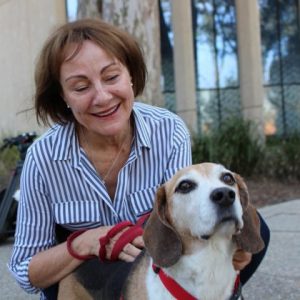
Owner Brenda Douglas with Hoover the world’s first patient to receive the novel nanomedicine.
A ten-year-old beagle with prostate cancer is helping researchers at The University of Queensland use nanomedicines to accurately diagnose and target the disease.
Hoover is the first patient in the world to receive the nanomedicine, which the research team hopes will help track and treat his cancer, and lead to better treatment for people with the same disease.
Nanomedicine is the science of developing tiny particles for applications in health – in this case therapeutics to specifically target a protein found in prostate cancer.
UQ Associate Professor Kris Thurecht said the new technology was important for advancing cancer treatments.
“Chemotherapy is a common treatment for most cancers,” he said.
“Unfortunately, it can also cause serious side effects because it is not always able to differentiate cancer cells from the healthy ones, sometimes damaging healthy cells in the process.
“Nanomedicines with the ability to target specific areas can lead us to target chemotherapy drugs to where they’re needed, and kill cancerous cells with minimal impact on healthy cells.
Dr Thurecht said pre-clinical studies had been successful in treating prostate cancer in the laboratory, leading to total remission in some cases.
“Validation of this science and technology in companion animals like Hoover is an exciting step forward in nanomedicine and towards human treatment,” he said.
Hoover was chosen for the trial because dogs – like humans – naturally develop prostate cancer.
Dr Rod Straw, Veterinary Oncology Specialist and Director of Brisbane Veterinary Specialist Centre and the Australian Animal Cancer Foundation, said the beagle could prove to be the vanguard for a revolution in health care.
“Cases like Hoover’s are very important to cancer research,” he said.
“We can learn to develop cancer treatments for not only pets but humans as well.
“Our best friends may hold the key.”
Dr Kris Thurecht has an affiliation with UQ’s Centre for Advanced Imaging (CAI) and Australian Institute for Bioengineering and Nanotechnology (AIBN).
The research was supported by CAI, AIBN, ARC Centre of Excellence in Convergent Bio-Nano Science and Technology, the Australian Research Council, the National Health and Medical Research Council, Australian Cancer Research Foundation and Q-TRaCE at Royal Brisbane and Women’s Hospital.
From Ten Daily
In a world-first trial Queensland researchers will treat 10 year-old Hoover’s prostate cancer with nano-medicines in a bid to fast-track its use in humans.
“He’s a ground-breaking, very important animal,” says Dr Rod Straw, a Veterinary Oncology Specialist from the Brisbane Veterinary Specialist Centre.
“Dogs are the only other animal that get prostate cancer spontaneously and instead of us inducing a cancer, we’re actually treating an animal that has cancer,” he says.
Hoover will be injected with experimental nano-medicines designed to specifically target diseased tissue.
“We engineer them to hang around in the body and circulate for a long time and every time they come across a tumour cell, they can bind to that tumour cell,” said Associate Professor Kris Thurecht, from the University of Queensland.
The nano-medicines can then fight those cells directly; a far more precise method than traditional chemotherapy.
But it’s the first time this treatment has been tested on anything larger than a lab mouse.
“Really what we’re hoping to do is translating the information and ideas we learned in the lab animals into a real model,” says Associate Professor Thurecht.
Doctor Straw predicts this may eventually allow trial drugs to be fine-tuned faster and used in humans more quickly.
“Hoover is a vanguard for us to do more trials in animals, but quickly bring that information to the human bedside,” he says.
Man’s best friend indeed.








